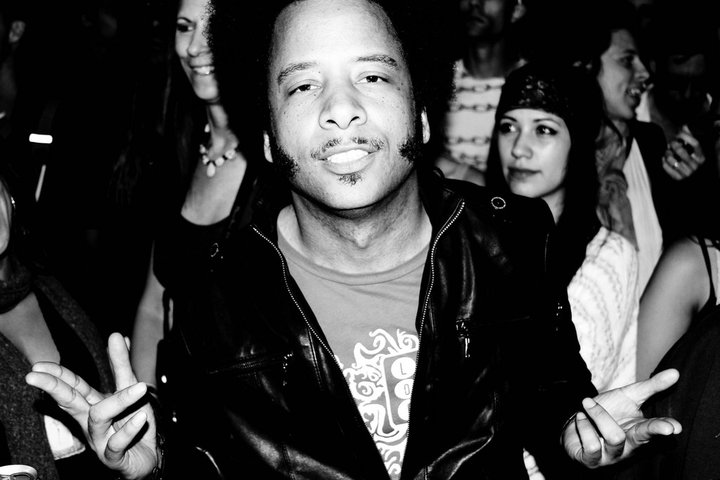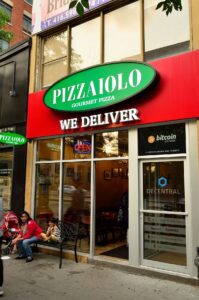Raymond “Boots” Riley was born on April 1, 1971 and is a founding member and lead vocalist for the Coup, a radical, edgy, Oakland-based underground hip-hop group.
Although he has received a fair amount of recognition with the Coup and their music, Riley’s intentions are to spread awareness about government corruption and to entice the masses to fight for change — calling for an overthrow of capitalism and imperialism. To this end, Riley became involved with the Occupy Oakland movement in 2011. Around town, Riley is thought of as one of the movement’s leaders, but the real story is a little different.
He had been visiting New York at the time of Occupy Wall Street in September 2011 but says to have become uninterested because the group did not seem organized enough. Back in the Bay Area in October of that year, Riley’s friends often brought him to Occupy Oakland meetings and rallies. During one rally, he stepped up to the mic to speak. Someone then came up behind him, asking him to tell the audience that they were going to go take over Frank H. Ogawa Plaza, which the movement renamed Oscar Grant Plaza. Riley made the announcement thinking that he was just reminding the crowd of a planned event. In actuality, Riley was the first person to disclose this plan to the crowd, tagging him as the leader of that particular march.
A sense of group unity was instilled in Riley from infancy, during which time his family lived in Detroit and were members of the Progressive Labor Party. He recalls wandering around knee-high among a bunch of adults making “party sounds,” and he was later told that those memories were of Labor Party meetings. The family later moved to Oakland. Once his family moved to Oakland, he himself joined the Progressive Labor Party. His father was initially upset about his joining because the Party had let a young man join without much research into the group. However, as Riley’s activism grew, so did his knowledge about how resistance groups work best. By the age of 19, Riley found himself burning out with the Progressive Labor Party.
Along with his interest in social justice, Riley developed a love and appreciation for music. Riley’s older sister, who played Stevie Wonder and Ohio Players records, had given him his first musical exposure as a child. Then in high school, Riley and his friend began to pound on their lunchroom tables and make their own music, where his friend Johnny realized he wanted to become a rapper. They both originally thought making music consisted of going into the studio and free-styling as they did at the table. Johnny began to seek music mentors at Keisha’s Inn in Berkeley. Having been also around the Keisha’s Inn crowd, Riley became more familiar with the music scene while meeting artists and organizers.
Comfort with the music scene helped Riley get together with musically inclined activists to start the Mau Mau Rhythm Collective. The name was inspired by a Kenyan resistance movement. Unlike the Kenyan movement, however, this group originally focused on creating art and bringing cultures together. As time went on, though, Bay Area voices shaped the group toward a more political focus — specifically toward issues affecting the working class in urban America. This distinctive fusion of art and resistance caught Riley’s attention, and he began imagining spreading the word of resistance through music.
From these early inspirations, the Coup was born in 1991: a hip-hop group that was to add a political edge to ‘90s hip-hop. The group started with Riley and his friends E-Roc and Pam the Funkstress; they released their first album titled Kill My Landlord in 1993. The Coup eventually grew to include more members: Hassan Hurd on drums, Silk-E on vocals, J.J. Jungle on bass, Grego Simmons on guitar, B’nai Rebelfront on guitar, and Lionel “LJ” Holoman on keyboard.
Riley’s vision for the group stayed fairly consistent considering that membership ebbed and flowed throughout the years as members left to focus on other pursuits, such as college. The most fluid element of the Coup has been its shifting between social justice movements over time because Riley is a revolutionary before he is a musician. Such deep focus on the political kept the Coup out of the national scene for several years. They were a revolutionary group that exposed people who used capitalism as a form of oppression. Since big music labels and venue owners were often tied to the same oppressive hierarchy that the Coup wanted to overthrow, they were largely kept out of the mainstream media and stayed predominantly in alternative media outlets, such as MTV and BET.
When it came to live performances, the group could hardly perform outside of the Bay Area because clubs would not let them in. Most venues had a negative view of hip-hop, claiming that it would cause riots if they allowed the group to perform. In fact, the police played a significant role in restraining the Coup. The police often shut down independent venues that wanted the group to come and perform. However, through promotion by the alternative media outlets and through producing consistently high-quality content, the Coup made an international impact on hip-hop and resistance movements.
For Riley, the two worlds of music and resistance coincide; he will play music at a rally, or conversely, a rally might inspire the lyrics to a song. In order to be productive, though, Riley oftentimes divides a year up, so he can commit his whole self to one project or movement at a time. For example, Riley devoted himself fully to the Occupy Wall Street movement. He is quoted as saying: “the Occupy Wall Street Movement reinvigorated my faith in the fact that there will be a movement that will overturn this system” (“The Rumpus Interview with Boots Riley of The Coup”). Additionally, being in Oakland has helped keep Riley’s spirits hopeful because of the inviting venues that encourage authentic expression and the neighborhoods that keep a sense of community alive.
In the world of hip-hop, Riley brings wit and wisdom to his music, and his collaborators tend to be in the same vein. He has worked with Talib Kweli, Black Thought, Anti-Flag, Das Racist, and Killer Mike, just to name a few. In a recent interview about Sorry to Bother You, his 2018 film, Riley emphasizes the importance of inspiring people, helping them to see solutions to their problems, and acknowledging the terrible things that may plague them. Riley infuses humor and wit into his lines, which makes him both a well-rounded MC and radical activist. He is just waiting for the rest of us to show up and join him.
Haunts:
- Music performances at Lake Merritt (Lake Merritt Ampitheater, Lake Merritt Boulevard, Oakland, CA 94612). Riley has lived all over Oakland, including San Antonio, which is made up of smaller neighborhoods, such as East Lake, Foothill, Fruitvale, Funktown, Jingletown, and Murder Dubbs. This part of town is close to Lake Merritt. Lake Merritt in the 2000s was a site of artistic convergence on the weekends. Artists of all kinds would meet to co-create, share, and relax.
- Hegenberger Road. Another common place to see performances by up-and-coming artists — dating back to the ‘80s — was in an abandoned office building along Hegenberger Road. In fact, the Coup shared the space with OutKast, Easy-E, and an upcoming girl group that Easy-E was promoting in the ‘90s.
- Today, Riley frequents 15th Street Galleries on 15th Street between Webster and Harrison in Downtown Oakland, which includes a spot that has been opened up by Prime, a young group that puts out clothes and hosts parties every Second Saturday. Around this area are other hotspots for the young, creative, and restless, such as Omiiroo, Tilde, and the Naming Gallery.
- Lower Bottoms. Another neighborhood that has made a big impression on Riley is a neighborhood in West Oakland known as Lower Bottoms, which is known for its intense interactions with police in response to racial profiling. This neighborhood fights back. In an interview with Vice, Riley professed: “It [Lower Bottoms] was the biggest feeling of community that I’d ever had.”
- Today, The New Parish (1743 San Pablo Avenue, Oakland, CA 94612) is Riley’s favorite Oakland venue for music, while his favorite places to eat are a three-way tie between Pizzaiolo, Bissap Baobob, and Aburaya.
~ by Camille Brown ~
External Links:
Riley, Boots. “Boots Riley Still Loves Oakland.” Vice, 1 Apr. 2016, https://www.vice.com/en/article/qbxqq7/boots-riley-oakland-travel-cityguides.
—. “The Rumpus Interview with Boots Riley of The Coup.” The Rumpus, 6 Dec. 2012, https://therumpus.net/2012/12/the-rumpus-interview-with-boots-riley/.
https://en.wikipedia.org/wiki/Boots_Riley
Image 1: The Naming Gallery
Image 2: Pizzaiolo


